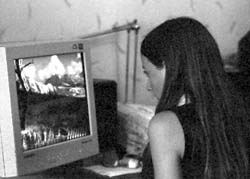Jailed for an illegal copy of Microsoft
Ukraine steps up struggle against software piracy
Lexfor, the legal representative of Microsoft in Ukraine, has advised The Day of the latest developments in law enforcement agencies’ efforts to curb violations of intellectual property rights. Their statistics point to over 860 crimes against intellectual property since the start of 2007.
Software piracy continues to be a problem. Whereas Ukrainians once regarded this problem as a matter of course, something people did without fear of punishment, now it appears that domestic pirates will have to change their mentality if they don’t want to find themselves behind bars.
Toward the end of last summer the regional departments of the Ministry of Internal Affairs of Ukraine continued to expose unauthorized copying and distribution of software. According to Lexfor statistics, last year Ukrainian law enforcement agencies carried out inspections at a number of enterprises and organizations to verify observance of intellectual property rights under current laws.
“Compared to last year, the results of efforts by interior ministry agencies show positive dynamics and are characterized by an increase in the number of detected crimes relating to intellectual property rights by more than two-thirds. Thus, during the first eight months of 2007, a total of 331 criminal cases were opened in connection with Article 176 (breaches of copyright and related rights) of the Criminal Code of Ukraine, compared to 207 cases during the same period last year. A total of 862 crimes against intellectual property have been detected this year, and militia task forces are stepping up efforts in this sphere,” announced Serhii Lebed, a departmental head in Ukraine’s interior ministry.
In August Lebed’s men in Khmelnytsky oblast inspected the Teofiopil Sugar Refinery and found unlicensed copies of Microsoft Windows and Microsoft Office. As a result, four PCs with pirated software were impounded. Lexfor says the damage sustained by Microsoft here amounts to 12,000 hryvnias. Criminal prosecution is underway.
In Kirovohrad oblast, a foreign national was found to be copying and selling unlicensed Microsoft Windows and Microsoft Office packages on the premises of a computer firm. During an inspection, law enforcement officials discovered 317 CDs and a PC with pirated software. The damages inflicted on the lawful owner of this software amounts to more than 14,000 hryvnias. Here, too, criminal prosecution is in progress.
A similar situation developed in the course of an inspection of the Mahistr Credit Union, where copyright damage was estimated at over 4,000 hryvnias, although criminal proceedings have not been initiated yet.
Microsoft officials say this is just the beginning. Microsoft’s legal representative in Ukraine, Vladyslav Shapoval, points out positive trends in the militia’s work. “Over the past several months there have been cases where wrongdoers in the sphere of intellectual property have been criminally prosecuted and sentenced for their crimes. We are drawing the militia’s attention to inspections and detection of criminal offences in retail networks where computers are often sold without preinstalled software. In most cases this is precisely what prompts beginners to acquire pirated software packages.”
“According to IDC, Ukraine places sixth as to its level of software piracy. The company is protecting its interests in all countries. Ukraine is no different from the rest. What you see is the result of the company’s expanding presence in the market and this market’s growth in terms of the general economy. Information technology (IT) is occupying an increasingly larger share,” says Valerii Lanovenko, director general of Microsoft Ukraine.
According to Lanovenko, Ukraine ranks among 12 countries with the most spectacular IT market growth rates: “Ukraine has taken its proper place and we are to be credited, of course. In four years Ukraine has moved from 14th place in its subregion to the world’s front line. This is not an excessively large aggression; it is the normal level of intellectual property protection. We will defend our rights in court.”
Why has the impunity of our domestic pirates lasted so long and is only being actively combated now? Participants of a roundtable held recently in Kharkiv to discuss “The Role of the State, Business, and Society in Solving Copyright Protection Problems,” claimed that Ukrainian legislation in the sphere of intellectual property is one of the best in Europe. Viktor Zhukov, a lawyer and author of the Criminal Code’s section on copyright protection, noted, however, that there is no uniform approach to the interpretation of legislative acts, and that there are certain difficulties in assessing damages that are sustained by the lawful owner.
The problem, it appears, is our mentality. The roundtable participants agreed that harsh punishments do not prevent violations of the law. Experts believe that the main task in combating piracy is to change the public’s mentality and inform people about the meaning of copyright and the risks involved in the use of pirated products.
Lanovenko pointed out some of these risks: “In addition to legal risks, something most are citizens are well aware of, there are serious technical risks in using pirated products. PC users with unlicensed software expose their machines to viruses, loss of data, confidentiality leaks, and they are denied the possibility of free updating and qualified technical support.”
Be that as it may, most PC owners in Ukraine are using unlicensed software and do not seem overly concerned about losing data or technical support. They will install a pirated Windows package without a thought about any laws prohibiting this. Experts say this is the crux of the matter. “Building an information society in Ukraine, this being a priority trend in its progress, largely depends on the transparency of the process of protecting intellectual property. Our country will develop a culture of respect for copyright only once all strata of the population understand the scope of this problem,” says Pavlo Orlov, president of Kharkiv Economics and Law University.






